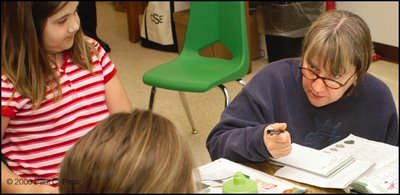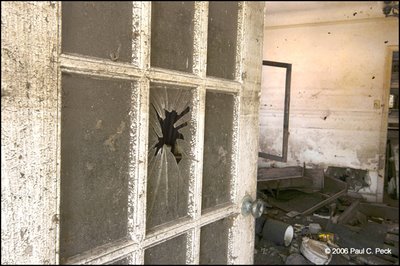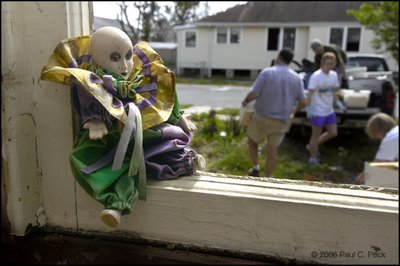Is it back to normal?
We (my husband Paul and I) have been home from our trip to New Orleans and the Mississippi Gulf Coast for one month today. I find myself with one foot still with the congregation of St. Paul’s New Orleans and the other here in Olympia, where we have resumed our routines of work and church; grocery shopping and gardening; feeding the cats and taking out the trash. My legs don’t feel long enough to stretch between these two worlds. God willing we’ll close that distance by returning to New Orleans in August or September.

Mindy interviews second graders at St. Paul's School in April
People who know of our travels ask, invariably, curiously and kindly: "What was it like? Was it horrible? What are the people doing? Is it back to normal? What do people need? Why are they staying there?"
It is hard to avoid answering these questions with cliches, such as "It was life-changing," although it was. I often find myself pointing to imaginary eight-foot marks (the level at which the water settled in many places in New Orleans) on walls and tend to babble in a not-so-great attempt to respond to what people want to know about the devastation. Truth is, and I mean no put-down by this, no matter how I try to answer these questions, you simply can’t understand what happened and what is happening in New Orleans unless you have been on the ground.
What was it like?
Do I describe the miles of dark, blown-out, uninhabited houses we saw on a late Friday night when we first drove through the Lakeview neighborhood, where 8,000 homes were lost? Or the spray-painted house numbering system used by National Guard units to show how many bodies and deceased pets they found during their searches?
Or do I describe the folks who have the spiritual backbone of faith that it will take to scrape away the paint (although not the memories of it) and rebuild and discover new ways of doing things in New Orleans? Do I talk about the tragedy of lives blown apart? Or do I talk about the loving hospitality offered and the life-long friendships made while we were there?
Many want to know about the stories they hear about the black vs. white, poor vs. not-so-poor in the city. I’m no help there. I can’t analyze or discuss with any kind of expertise the centuries old racial, social and economic divides in New Orleans. What I can say is that people all over the city are in need.
Was it horrible?
I think this question has two parts: Was it horrible for the people of New Orleans? Was the damage we saw horrible?
Yes and yes.
I find myself trying to explain what happened in New Orleans like this: People fleeing Hurricane Katrina thought they were leaving the city for three or so days. The hurricane passed, but the water from the levee failures filled up most of the city like a giant bathtub. Folks landed in places across the country. Those who came back, some as long as five or six months later, found the interiors of their homes looked as if a washing machine full of their belongings had been subject to a really long wash and rinse cycle that didn’t spin.
In Lakeview, a mostly white, middle class neighborhood where we spent our time, those who are choosing to stay, for the most part, will bulldoze and rebuild. I know that is not the case in the Ninth Ward, a mostly black and low-income neighborhood that we saw only briefly. Much is being written about the disparities between the two; again, I don’t pretend to analyze or judge any of this.
In both places, many people went back to their houses, took a peek inside, closed what was left of their doors and walked away. It was too painful to try to reclaim whatever was left. They won’t be back. Others chose to not return at all. House-for-sale signs outnumber FEMA trailers just about everywhere.
What are the people doing?
Surviving. Making plans for the future as best they can. Trying to make mortgage payments on homes they can’t live in and payments on cars they can’t drive. Fighting with insurance companies. Finding humor where they can. Taking their kids to school. Trying to find jobs and

People say: "I can’t imagine that" I respond by saying, "No, you can’t."
reopen businesses. Getting out of bed every morning and putting put one foot on the floor, and then another, and then managing to get on with the day. If you are in New Orleans to stay, there’s not much more to do than that. Folks don’t try to answer the question "where do I start?" They just start.
Is it back to normal?
No. Imagine life in a neighborhood with no schools, no day-cares, no dry cleaners, grocery stores, doctors or dentists. A gallon of milk or a pair of sneakers or a six-pack can’t be found at the nearby convenience store or strip mall – those stores just aren’t nearby anymore.
I believe that more troubling than the loss of stuff was the loss of routine, the day-to-day things most of us don’t have to plan for, or even really think much about. Two-thirds of the city’s population still hasn’t come back, and there’s speculation that many never will. The effects of this on neighborhoods, businesses and yes, that blessed routine, are profound. When people say: "I can’t imagine that" I respond by saying, "No, you can’t."
The things that do speak of normalcy are precious. Some folks are beginning to re-landscape – occasional lawns are popping up, and gardens are being re-planted. Birds and squirrels are returning after a several-month absence, along with the housecats that stalk them. At the home of our New Orleans hosts, Phil and Natalie James, sparrows fed chirpy new babies nesting in a bright red birdhouse.
The James were among the blessed – their home was on high ground and did not flood. But like everyone else, they have a harrowing story about having to evacuate by boat, move to another state and worry about what was going on in their city until they could return weeks later. Their neighborhood now is much like the suburbia many of us are used to, with a few exceptions: holes where large trees used to be, FEMA trailers nearby, the occasional stinky refrigerator waiting on the curb for pickup, and the sound of relentless pile-driving that’s shoring up the levee nearby.
What do people need (or not)?
They don’t need or want to be known as victims. These folks are survivors. They don’t need boxes of cast-off clothing that is ripped and full of holes. They don’t need pity or understanding nods or "I’m sorrys".
What they seem to need most of all is simply to talk to people who are willing to just listen – it helps them process what has happened. They need to know that after nine months, we haven’t indulged our incredibly short attention spans and forgotten them. They need to know that someone still cares about them. They need to know that we are praying for them. They need to know we don’t second-guess their decisions to rebuild.
Why are they staying there?
This is easy. New Orleans is home – pure and simple. No matter what neighborhood they live in, or used to, these folks are New Orleanians. Their city and their culture: their music, their food, their Mardi Gras celebrations, their history and their heritage keep them there. I find myself wondering what it would be like if I’d never moved more than a block or two away of where I grew up, instead of moving across the country. Would I feel the same way if my city was destroyed? Would I feel angry at storms and flooding and tornadoes and looters? Would I share the same resolve these folks do? Or would I, seeking some kind of safety, just move on?

Mardi Gras doll found at St. Paul's during a Saturday work party
As we made our decision to go to New Orleans, I somewhat self-righteously declared (and I am prone to these sorts of declarations) that this would be a Holy Week pilgrimage. In my mind, that meant that no matter what obstacles Paul and I faced along the way, we weren’t allowed to complain. After all, pilgrimages are all about discovery, not frustration.What I was not prepared for, and still do not fully comprehend, is that this really did become a pilgrimage for me. I found a place where I didn’t try to have all the answers to other people’s problems. I found my heart expanding in some rare and transient moments of being totally open to God’s call to love and to serve. This is still too big and too powerful for me to understand and practice on a regular basis. I see resurrection at work at St. Paul’s. I hope that will take place in me. I hope I can use this here.
When we returned, Fr. David James, our priest at St. John’s, asked me what I learned during our trip. The first thing that popped into my mind, and what I told him, is that I took much more away from it than I was able to give.
And what was that? I’m still not sure, but my heart seems to beat a bit differently these days. I carry with me, even a month later, what I learned about people who I thought of, before we went to New Orleans, as hopeless, powerless, and clinging to the past. They are none of these things.
They have many things to teach us about hope, about faith, about love. Their pilgrimage, and mine, have only just begun.

2 Comments:
I'm not sure if you know, but Troy and I lived in New Orleans for about two years. We think of the people we knew down there often, and wonder how they are. Many we cannot find, since the hurricane.
I hope they are among the people who are rebuilding and trying to create a new normal, since the old normal has changed.
Thank you for sharing such a powerful experience.
To everyone who came and volunteered or who sent their support in other ways, such as prayer and donations...THANK YOU THANK YOU THANK YOU!!!!!
I am a native New Orleanian and also live in the Lakeview area my whole life. We are doing great and have our God and people like you to thank for that. It is hard but, we will recover completely.
Post a Comment
<< Home